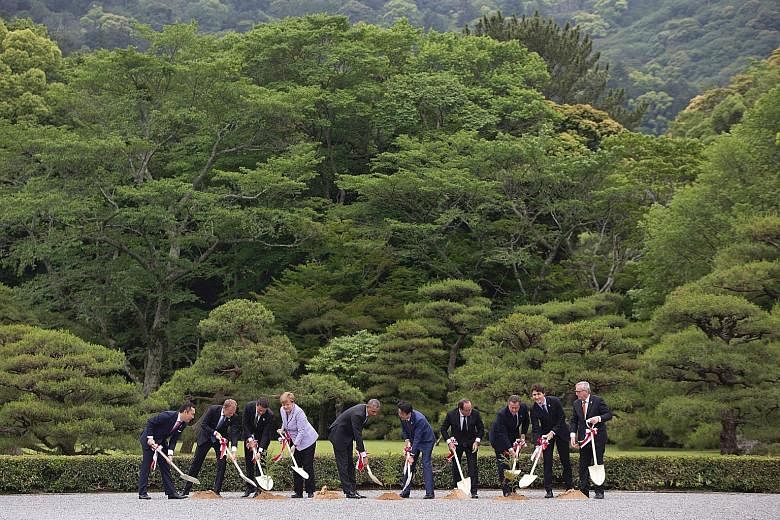Japanese Prime Minister Shinzo Abe invoked the Lehman Brothers collapse as he urged his fellow leaders from the Group of Seven (G-7) advanced economies to unite in a more urgent and coordinated response to deal with the sputtering global economy.
The fall of the US investment bank giant in September 2008 triggered the global financial crisis that countries are still recovering from.
Stressing the dire economic outlook, Mr Abe presented International Monetary Fund data showing that global commodity prices plunged 55 per cent between June 2014 and January this year. The last time this happened, he noted, was between July 2008 and February 2009, a period that saw the collapse of Lehman Brothers.
The annual G-7 summit brings together leaders of Britain, Canada, France, Germany, Italy, Japan and the United States. The European Union is also represented in the club.
Deputy Chief Cabinet Secretary Hiroshige Seko told reporters after the session that leaders agreed on the need for flexible spending to spark world growth, but left individual countries to decide on when and how much. He added that some saw no need for stimulus spending.
The call for greater cooperation came after G-7 finance ministers disagreed last week on the best way to boost growth. Japan advocated fiscal stimulus and greater public spending, in a push supported by France and Italy but rebuffed by pro-austerity Germany and Britain, which called for structural reforms.
Also on the agenda yesterday were security issues, including maritime claims in the South China Sea that have pitted an increasingly assertive China against other claimants. Washington is not a claimant but has accused Beijing of militarising the contested waters. Japan and China are involved in a separate dispute in the East China Sea.
The leaders agreed that it was important for the G-7 to send a clear and strong message on maritime claims, which have raised tensions in the South China Sea.
European Council president Donald Tusk had earlier said on the sidelines of the summit that the group- ing's credibility was on the line.
The G-7 position angered Beijing, which had warned the grouping against meddling in the South China Sea. Foreign Ministry spokesman Hua Chunying reiterated that the issue had nothing to do with the G-7 and slammed Tokyo for "hyping up" the issue.
The G-7 leaders' day had begun on a tranquil note, when they visited the Ise Grand Shrine, the most holy site of the Shinto religion.
After the summit ends today, Mr Abe and US President Barack Obama will travel to Hiroshima - the site of the world's first nuclear attack in 1945 - where they are likely to call for denuclearisation.

